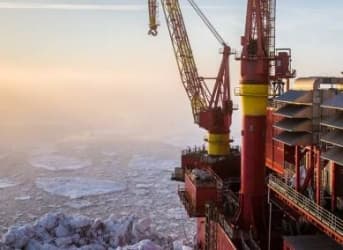First, it was the U.S. company ExxonMobil. Then, France’s Total. Now western sanctions against Russia have led Royal Dutch Shell to discontinue its work with Gazprom Neft extracting shale oil from a field in Siberia.
In announcing Shell’s suspension on its website, Gazprom Neft, part of the Kremlin-run gas monopoly Gazprom, said it will continue work “by itself” on the first horizontal exploratory drilling at the Bazhenov shale in Siberia, which began last week.
In its own statement, Shell said the sanctions had begun to affect its enterprises in Russia, some already under way, others still in the planning stages. On Sept. 19, Olivier Lazare, the president of Shell Russia, said the sanctions hadn’t changed its strategy of working with Russian companies, but he added, “[O]f course we have to comply with the sanctions.” And they did.
Related: Another Western Energy Company Ends Russian Cooperation
The United States and the European Union imposed the sanctions on Russia because of its unilateral annexation of Ukraine’s Crimean peninsula in March and its suspected involvement in providing arms, military personnel and other assistance to pro-Russian separatists in eastern Ukraine.
The measures especially target Russia’s vital energy sector, sharply limiting financing for Russian oil and gas companies and forbidding Western companies to export to Russia certain advanced technologies needed for drilling in shale and in the Arctic.
The Shell statement said, “We are working closely with relevant authorities and our partners to determine what the exact impact of those [sanctions] will be.” Alexander Dyukov, the CEO of Gazprom Neft, said Shell also is meeting with regulators to determine how it might resume its work with his company.
Shell is the third Western energy company forced to suspend joint operations with Russian partners because of the sanctions. In September, ExxonMobil Corp. had to halt offshore Arctic drilling with another Kremlin-owned company, Rosneft. Soon afterward, France’s Total said it had to abort plans to explore for shale oil in Siberia with Russia’s Lukoil.
Related: The Black Sea: A New Frontier for Energy Geopolitics?
In fact, the Financial Times reports that government officials and energy executives, whom it did not name, believe that large western oil and gas companies probably will avoid working with their Russian counterparts on shale oil enterprises until the sanctions are lifted.
The consensus, it says, is that the impact on Russia won’t be very large in the near term, but it would be felt eventually because Russia had hoped, with Western help, to match or even outstrip the United States’ boom in shale oil and gas during the coming decade. Moscow even offered tax breaks for western partners last year, quickly attracting Britain's BP, Exxon, Shell, Norway's Statoil and Total.
The payoff for both Russian and western companies might have been enormous. The U.S. Department of Energy estimates that Russian shale deposits are the largest in the world, at 75 billion barrels.
By Andy Tully of Oilprice.com
More Top Reads From Oilprice.com:
- Low Oil Prices Raise The Risk Of Recession In Russia
- Central Asia Rues Dependency On Russian Fuel
- Winter Gas Supply Crunch In Europe Unlikely, Experts Say



















the more you get money the more you get shale gas and oil. It is possible just in U.S.! U.S. are the best to construct financial pyramids! "Shale revolution" is the next after "dot coms" and 2008!
Russia has enough traditional oil and gas deposits...